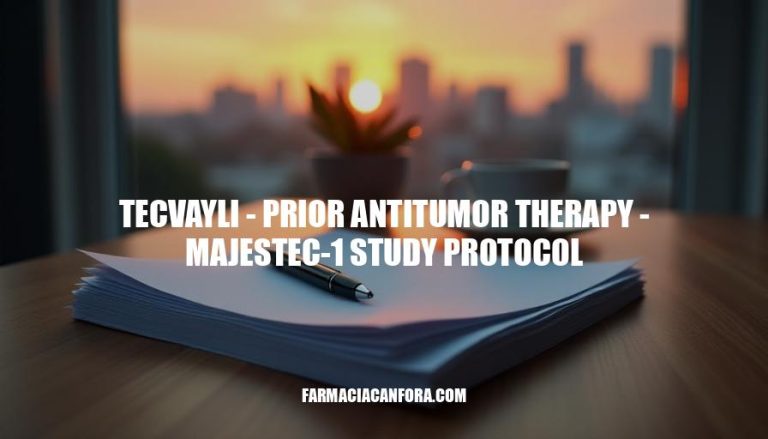


Tecvayli is a new medicine that’s making waves in the fight against cancer. It’s been approved to treat a type of blood cancer called multiple myeloma, which can be hard to beat.
The people behind Tecvayli ran some important tests on patients who had already tried several other treatments without success. These tests showed that Tecvayli could really help these patients by killing the bad cells and giving them more time.
Tecvayli works by getting the body’s immune system to attack the cancer cells.
It does this by binding to two different parts of the cell, which makes it easier for the immune system to find and destroy the bad guys. This is a new way of treating multiple myeloma, and it’s showing promise in helping people who haven’t responded well to other treatments.
<a href=
The MajesTEC-1 study is a pivotal Phase 1/2 clinical trial designed to evaluate the efficacy and safety of Tecvayli (teclistamab-cqyv), a bispecific B-cell maturation antigen (BCMA)-directed CD3 T-cell engager, in patients with relapsed or refractory multiple myeloma (RRMM) who are triple-class exposed and have received at least three prior lines of therapy.
Study Design:
The study consists of two parts: Phase 1 (dose escalation) and Phase 2 (dose expansion). The primary objective of Phase 1 is to identify the recommended Phase 2 dose (RP2D) and schedule for Tecvayli, while the primary objective of Phase 2 is to evaluate the overall response rate (ORR) at the RP2D.
Patient Population:
The study includes adult patients with RRMM who have received at least three prior lines of therapy, including a proteasome inhibitor, an immunomodulatory agent, and an anti-CD38 monoclonal antibody. Patients must have measurable disease, an Eastern Cooperative Oncology Group (ECOG) performance status of 0-2, and adequate organ function.
Key Endpoints:
Primary Endpoints:
Phase 1: Safety and tolerability of Tecvayli, including the incidence of dose-limiting toxicities (DLTs) and adverse events (AEs).
Phase 2: Overall response rate (ORR), defined as the proportion of patients achieving a partial response (PR) or better.
Secondary Endpoints:
Duration of response (DOR)
Progression-free survival (PFS)
Overall survival (OS)
Minimal residual disease (MRD) negativity rate
Time to response (TTR)
Safety and tolerability, including the incidence of cytokine release syndrome (CRS) and neurotoxicity.
Inclusion Criteria:
Patients with relapsed or refractory multiple myeloma who have received at least three prior lines of therapy, including a proteasome inhibitor, an immunomodulatory agent, and an anti-CD38 monoclonal antibody.
Measurable disease as defined by the International Myeloma Working Group (IMWG) criteria.
ECOG performance status of 0-2.
Adequate organ function, including renal, hepatic, and hematologic function.
Specific Objectives:
The primary objective of the MajesTEC-1 study is to evaluate the efficacy and safety of Tecvayli in patients with RRMM who have limited treatment options. The study aims to determine the ORR, DOR, PFS, OS, and MRD negativity rate, as well as to assess the safety and tolerability of Tecvayli.
Importance of the Study:
The MajesTEC-1 study is crucial in evaluating Tecvayli’s efficacy and safety in a heavily pretreated patient population with high unmet medical needs. The study’s findings have the potential to transform the treatment paradigm for RRMM and provide new therapeutic options for patients who have exhausted other treatments.
:
:
The MajesTEC-1 study is a pivotal Phase 1/2 clinical trial evaluating the efficacy and safety of Tecvayli, a bispecific B-cell maturation antigen (BCMA)-directed CD3 T-cell engager, in patients with relapsed or refractory multiple myeloma who have received at least three prior lines of therapy. The study aims to determine the overall response rate, duration of response, progression-free survival, and overall survival, as well as assess the safety and tolerability of Tecvayli.
The findings from this study have significant implications for future antitumor therapies. Tecvayli’s mechanism of action, which involves binding to two different parts of the cancer cell, making it easier for the immune system to find and destroy the bad cells, represents a new approach in treating multiple myeloma. The study’s results demonstrate that Tecvayli can provide patients with longer-term benefits, including a duration of response of 22 months.
The potential impact of Tecvayli on future antitumor therapies is substantial. By targeting BCMA, a protein expressed on the surface of cancer cells, Tecvayli offers a promising new avenue for treating multiple myeloma. This approach may also be applicable to other types of cancers that express similar proteins, potentially expanding its therapeutic scope.
The MajesTEC-1 study’s findings have significant implications for improving outcomes for patients with relapsed or refractory multiple myeloma. Patients who have exhausted other treatment options often face limited choices and poor prognosis. Tecvayli offers a new hope for these patients, providing them with a potentially effective and tolerable treatment option.
The significance of continued research and clinical trials in this area cannot be overstated. The development of innovative therapies like Tecvayli relies on the dedication of researchers, clinicians, and patients who participate in clinical trials. Continued investment in research and clinical trials will be essential for advancing our understanding of multiple myeloma and developing effective treatments that improve patient outcomes.